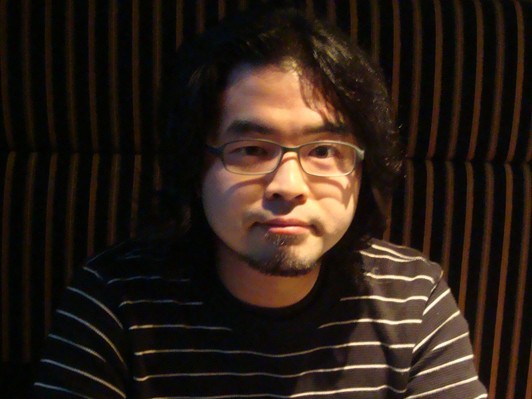
Scroll down for an English article about the film on Nanjing Massacre made by a young Japanese director, to be featured in the Hong Kong International Film Festival.
香港国際映画祭で上映される映画『南京・引き裂かれた記憶』の紹介です。監督インタビューについては下記リンクをご覧ください。下記は英語による映画案内の転載です。2007年12月、南京大虐殺70周年の東京での催しでこの映画を初めて観て衝撃を受けました。南京で戦った兵士による数々の直接証言は南京大虐殺の真実を強く裏付ける貴重なものです。大虐殺事件60周年を機に全国に呼びかけ、全国を回って生存している兵士の話を聞いた松岡環さん、そしてこの映画を作った武田さん、関係者の皆さまに尊敬の意を表したいと思います。松岡環さんの本『南京戦 閉ざされた記憶を尋ねて―元兵士102人の証言』、『南京戦 切りさかれた受難者の魂―被害者120人の証言』(社会評論社)もお勧めします。この投稿の最後に予告編(日本語版)もあります。
由日本年轻导演武田伦和执导,记录了参与了南京大屠杀的原日本军士兵及大屠杀幸存者证言的电影纪录片《南京,被割裂的记忆》已于近日在日本正式上映。这是日本本土导演制作的第一部关于南京大屠杀的影片。
Japanese director documents accounts of Nanjing Massacre (Feature)
(Text from M&C Website)
(Photo from the website of the interview of director Tomokazu Takeda 写真は『南京・引き裂かれた記憶』武田倫和監督インタビューより)
By Takehiko Kambayashi
Osaka, Japan - When Tomokazu Takeda, a young Japanese director, was asked to help produce a documentary on the Rape of Nanjing, he only recognized the name, but did not know what had happened in that Chinese city.
And he never imagined the work would lead him to memories of his late grandfather.
'I recalled one sentence that contained the words in our textbook. I never thought of what Japan had done,' Takeda said.
The 84-minute independent film Torn Memories of Nanjing is to be presented Tuesday at the 34th Hong Kong International Film Festival. The film consists mainly of vivid accounts of the atrocities by Chinese victims and former soldiers of Japan's Imperial Army.
On December 13, 1937, Japanese troops marched into Nanjing, the Chinese capital at the time, and murdered hundreds of thousands of Chinese people including many civilians in a six-week orgy of violence.
That violence left 300,000 people dead and 20,000 women raped, Chinese authorities say. In Japan the number of dead is believed to be much lower. Many Japanese including some historians and journalists even flatly deny the slaughter, calling the events an 'incident.'
To counter such claims, Tamaki Matsuoka, a former elementary public school teacher and co-director of the film, spent a decade interviewing more than 300 Chinese victims and 250 Japanese soldiers.
Soldiers involved in the killing 'were talking vividly as if it happened yesterday,' Takeda, who is in his early 30s, said.
Juhei Teramoto, a former soldier, said in the film, '[In Nanjing,] superior officers told us to commit robbery, murder, rape and arson and do anything.'
Takeda was even shocked to hear some former soldiers interviewed brag about how many women they had raped.
'You know, we were young men and we were the ones who might die the next day, so we wanted to sleep with a girl,' Teramoto said.
Many of the soldiers, Takeda said, 'still did not see Chinese people as human beings. It seems they had no opportunities to correct or reflect on that view after the war.'
However, when a 90-year-old former Japanese soldier travelled to Nanjing with Takeda and Matsuoka and went right to the monument commemorating victims, he collapsed in tears, the director recalled.
The soldiers' stories made Takeda remember his grandfather, who was dispatched as a soldier to Nanjing after the 1937 killings.
His grandfather was usually calm but once he got drunk he became very violent, Takeda said. 'My parents told me that grandfather apparently was haunted by Chinese ghosts from time to time. And he was often screaming, 'Chinese are going to attack me,'' Takeda said.
Like his grandfather, very few former Japanese soldiers passed on their wartime experiences to the next generation, he said. 'Had they talked about it, that would have been much more educational than what we learn at school.'
Meanwhile, people in China continue to teach the next generation about their suffering during the war, he said. 'So, there has been a widening gap between the two countries in terms of their understanding of the war.'
When Takeda told acquaintances in his age group about the film, some of them told him not to get into that topic and others said China was also in the wrong.
'They seem to confuse the present with the past and they just want to talk about a 'good Japan,'' he said.
That view seems to typify a lack of broad public awareness of wartime history in Japan, which emphasizes sufferings such as the US atomic bombings of Hiroshima and Nagasaki and ignores the actions of the Japanese abroad.
'I believe humans want to face in a direction where they feel comfortable,' Takeda said.
When Takeda visited several Chinese victims, he continued to wonder what his grandfather had done there, he said.
But then, some Chinese reminded him that the Japanese soldiers were also victims, a reminder probably for him as the representative of a younger generation.
However, Takeda doubted they would say the same thing to the soldiers themselves, as many victims were still afraid of older Japanese.
'We were told to fight for the sake of the emperor, but we were actually fooled into going to war,' Teramoto said.
See also Mainichi Newspaper's report (AP)
(See Movie Trailor Below - Japanese Version)
日本教师及著名社会活动家松岗环及旅日华人林伯耀于十年前开始从事采访日军老兵及收集南京大屠杀相关证据的工作。随着证据的积累,他们产生了拍摄一部纪录片的想法。在年仅30岁的青年导演武田伦和的帮助下,这部影片已于去年完成并正式在日本上映。
影片已没有经过任何模糊化处理的画面纪录了6位日军老兵和7名中国受害者的证言。在摄制组的努力之下,一些日军老兵克服了顾虑,讲出了他们亲身经历的大屠杀。一些老兵还向摄制组提供了书信,日记等宝贵的历史证物。
武田伦和导演在接受采访的时候说:“我并不因为自己是加害方而感到悲观。只有加害方也行动起来,加害、被害者之间被割裂的深深鸿沟,才有可能被填平。”影片《南京,被割裂的记忆》的上映,无疑为填平两国对历史认识的鸿沟起到了积极的作用。
以下连接是中国《青年周末》杂志对此事的采访报道
A news report of this movie, from China Youth Weekend. (Chinese only)
http://news.sina.com.cn/c/sd/2009-10-29/102618933540.shtml
Where can I watch or buy this documentary?
ReplyDeleteThanks